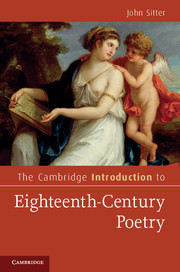Chapter 8 - Metapoetry beyond Pope
from Part II - Poetic consciousness
Published online by Cambridge University Press: 05 June 2012
Summary
Since Pope had the richest poetic career in the eighteenth century, it is not surprising to find the deepest and most sustained metapoetic reflection in his work. But such metapoetic self-consciousness appears in many other writers as well, and focusing on it allows us to see the active tensions in a range of eighteenth-century poetry. Working from within the poetry, rather than assuming a “background” of pre-existent ideas that are then versified, should give us more meaningful ways of reading much of the period’s poetry. Eighteenth-century poems are of course about many things other than poetry; indeed, rarely in literary history has poetry’s purview been wider. Yet poet after poet writes with self-conscious reflection on two metapoetic topics that are theoretically distinguishable but frequently overlap: the nature of poetic vocation and the role of poetry. We sometimes assume that poetry became its own preoccupation only in the modern era, but metapoetic themes abound in eighteenth-century poetry.
The vocation of invocation: melancholy, contemplation, celebration
When Thomas Gray says of the poet within his Elegy Written in a Country Churchyard that “Melancholy mark’d him for her own,” he epitomizes an association between the poet and solemnity that had begun to appear earlier in poems by writers such as Anne Finch and Thomas Parnell and that would continue throughout the century. Milton explicitly linked the poet and melancholy in Il Penseroso (16), but Il Penseroso is a somewhat playful poem, paired with a counter-argument, L’Allegro, in which the poet chooses Mirth over Melancholy. Il Penseroso had many imitators in the 1740s and after, but the suggestion that the poet chooses or is chosen by melancholy shows an influence much broader than Milton’s. Renaissance emblem books and other conventional representations associated melancholy with solitude and reading; having a character walk on stage alone carrying a book was enough to indicate his melancholy frame of mind. What becomes stronger in the eighteenth century is the association of melancholy and writing.
- Type
- Chapter
- Information
- The Cambridge Introduction to Eighteenth-Century Poetry , pp. 133 - 148Publisher: Cambridge University PressPrint publication year: 2011



